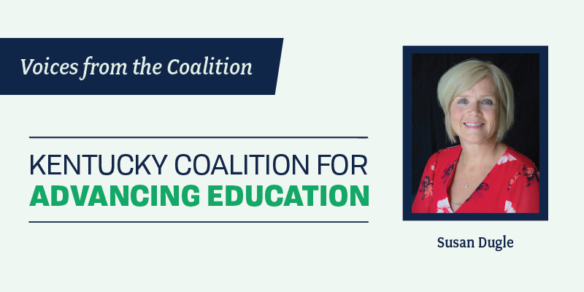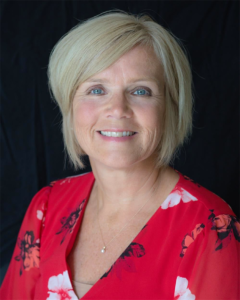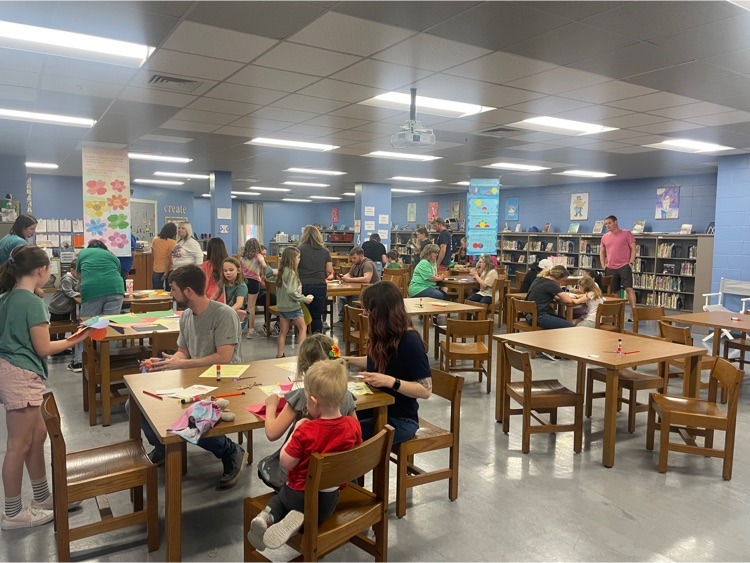 Editor’s Note: This is the third in a series of columns that will be published throughout July highlighting the experiences of different members of the Kentucky Coalition for Advancing Education and the work that will take place moving forward.
Editor’s Note: This is the third in a series of columns that will be published throughout July highlighting the experiences of different members of the Kentucky Coalition for Advancing Education and the work that will take place moving forward.
As the chief academic officer for Shelby County, I was excited to participate in the Kentucky Coalition for Advancing Education (KCAE).

Susan Dugle
For the past several years, Shelby county has been working as a community and also in partnership with other districts and the Division of Innovation at the Kentucky Department of Education (KDE) to bring together a graduate profile, keystone portfolio defenses and a range of personalized learning strategies. In that work I have seen the power of bringing people together and setting a shared vision for the future of learning for our children and our community.
Our work began six years ago when the community of Shelby County came together to agree upon what competencies a graduate of Shelby County Public Schools (SCPS) should demonstrate in order to contribute to a global society. More than 200 stakeholders decided that a SCPS graduate should be an effective communicator, responsible collaborator, inspired innovator, critical thinker, lifelong learner and a global citizen.
During the spring of 2021, 5th-, 8th- and 12th-graders defended their readiness for the next step in their lives by presenting artifacts to demonstrate transference of these competencies into the world around them. This fall, SCPS is embarking on the final year of a 4-year Strategic Leadership Plan that includes three domains – Personalized Learning, Talent Development and Culture of Excellence. In SCPS we see personalizing learning as an essential strategy to ensure each learner builds and can demonstrate the competencies in our profile.
Over the past 5 years, we have had the opportunity to collaborate with the Division of Innovation at KDE and a group of like-minded visionary leaders from other Kentucky districts that also are building the foundation for personalized learning in their communities. The work in each district is better because we collaborate. And collectively, I believe our work helps form a foundation upon which the work of KCAE and the Local Laboratories of Learning can build.
I have appreciated the inclusive design thinking process the KCAE has been using. From the intentional formation of the coalition – which represents all voices from across Kentucky’s geographical regions and role groups – to gathering the experiences of Kentuckians through the virtual listening tours and empathy interviews, the process has forced all stakeholders to gain insight from various perspectives.
After gathering quotes and insights, members of the coalition developed user profiles for each role group (students, teachers, families, community members, and school and district leaders), The task has given me the opportunity to work with newfound colleagues from across Kentucky and build relationships with students, parents and community members from other parts of the Commonwealth. It has given us time to not only categorize needs and make inferences about the users, but also learn from one another through our struggles and celebrations.
As our coalition moved into finding trends and creating storylines that capture the experiences, needs and insights for each user group, we soon began to realize that there were many compelling needs that were common across these user groups. The storylines show that we all want relevant, meaningful and personalized curriculum, instruction and assessment for all students. The need for effective communication, responsible collaboration and real connections rose to the top of every storyline.
I am looking forward to the upcoming work of the coalition as we join work groups throughout the month of July to create four key artifacts: a description of the current state of education in Kentucky, a description of our shared vision for the future, a set of questions that local communities will pursue related to assessment and accountability, and a guide for these local teams sharing what we learned in the KCAE about how to bring together an inclusive group and support them in co-creation.
Shelby County Public Schools has been on a journey to competency-based learning and performance assessment over the past 10 years. We have worked with partners from California to New Hampshire to learn and grow in this work. The most amazing aspect of the work in Shelby County is that our teachers and school administrators are the leaders in developing personalized, relevant and rigorous learning opportunities for our students. They have shared this work in conferences, articles and webcasts both nationally and internationally. They continued to push toward these equitable opportunities for all students to succeed even through the struggles of the pandemic.
I am amazed every day at the deep learning happening in SCPS – inside and outside the classroom walls. I am excited that we have a coalition of students, teachers, families, community members, school leaders and district leaders to continue to push forward for all kids in Kentucky.
The work of the coalition has prepared me to lead a Local Laboratory of Learning in the Shelby County community alongside students, families, educators, community members and business and industry leaders. I am excited to elevate the voices of my hometown, the place that educated me inside and outside classroom walls from 1st through 12th grades and received me back home for the past 30 years to work alongside the community in building the future of students from Shelby County and Kentucky.
Susan Dugle is the chief academic officer for Shelby County Public Schools. She is a member of the Kentucky Coalition for Advancing Education.
HOW YOU CAN GET INVOLVED
Local Laboratories of Learning (L3s) serve as reciprocal learning partnerships between a school district, parents, students, educators and others who have the greatest awareness of the needs and desires of the local community.
Like the Kentucky Coalition for Advancing Education, these community-based partnerships aim to create a more equitable future for education in Kentucky through an inclusive co-design process. We believe that the most powerful insights will come from teams that feature the voices of communities that have been traditionally marginalized and not included in decision-making about accountability and assessment.
Local families and community members can participate by joining their L3 team or by assisting with empathy interviews to gather stories from people in the community and sharing those experiences with the local team. Through these efforts, districts and community members will create a system of assessment and accountability that reflects the diversity of the students, families and communities it represents.
For more information about L3s, email Sarah Snipes, program consultant for the KY Innovative Learning Network at the Kentucky Department of Education.




Leave A Comment